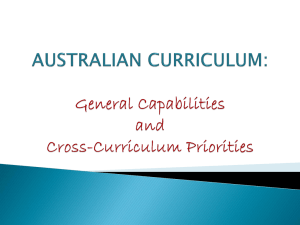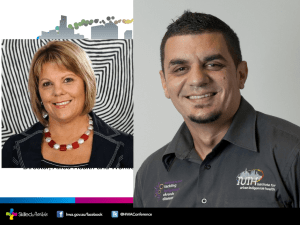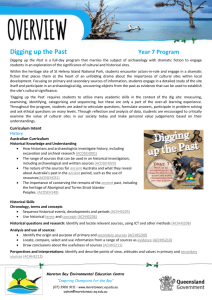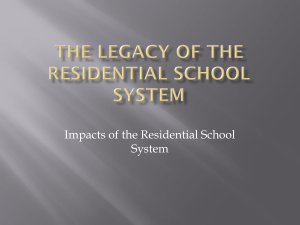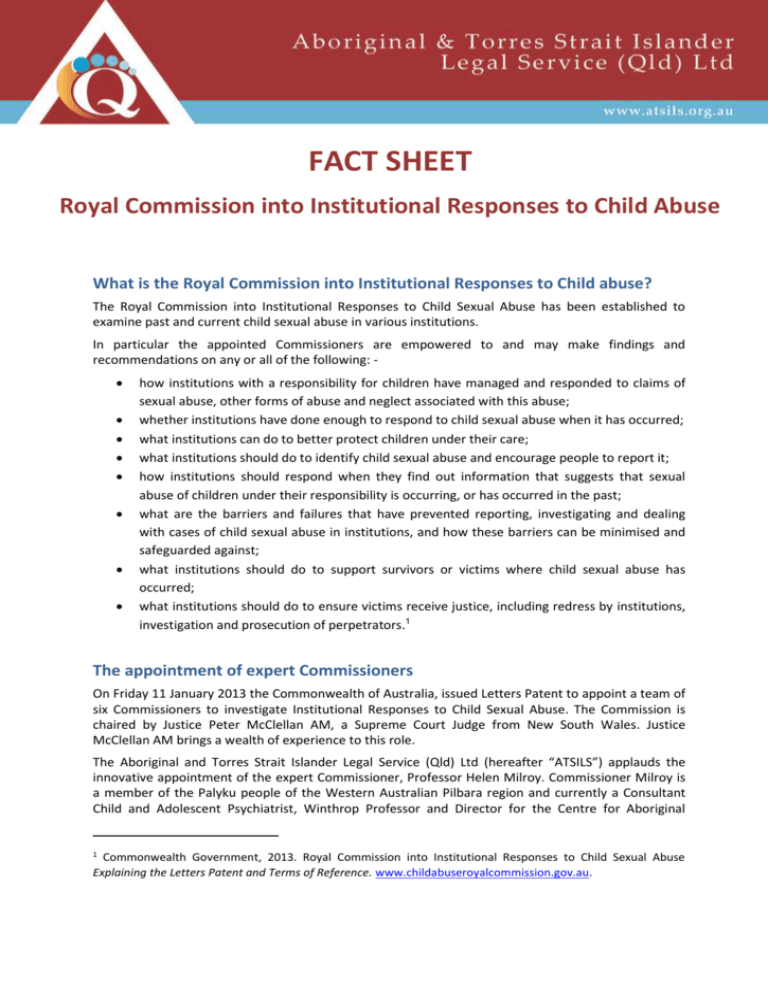
FACT SHEET
Royal Commission into Institutional Responses to Child Abuse
What is the Royal Commission into Institutional Responses to Child abuse?
The Royal Commission into Institutional Responses to Child Sexual Abuse has been established to
examine past and current child sexual abuse in various institutions.
In particular the appointed Commissioners are empowered to and may make findings and
recommendations on any or all of the following:
how institutions with a responsibility for children have managed and responded to claims of
sexual abuse, other forms of abuse and neglect associated with this abuse;
whether institutions have done enough to respond to child sexual abuse when it has occurred;
what institutions can do to better protect children under their care;
what institutions should do to identify child sexual abuse and encourage people to report it;
how institutions should respond when they find out information that suggests that sexual
abuse of children under their responsibility is occurring, or has occurred in the past;
what are the barriers and failures that have prevented reporting, investigating and dealing
with cases of child sexual abuse in institutions, and how these barriers can be minimised and
safeguarded against;
what institutions should do to support survivors or victims where child sexual abuse has
occurred;
what institutions should do to ensure victims receive justice, including redress by institutions,
investigation and prosecution of perpetrators.1
The appointment of expert Commissioners
On Friday 11 January 2013 the Commonwealth of Australia, issued Letters Patent to appoint a team of
six Commissioners to investigate Institutional Responses to Child Sexual Abuse. The Commission is
chaired by Justice Peter McClellan AM, a Supreme Court Judge from New South Wales. Justice
McClellan AM brings a wealth of experience to this role.
The Aboriginal and Torres Strait Islander Legal Service (Qld) Ltd (hereafter “ATSILS”) applauds the
innovative appointment of the expert Commissioner, Professor Helen Milroy. Commissioner Milroy is
a member of the Palyku people of the Western Australian Pilbara region and currently a Consultant
Child and Adolescent Psychiatrist, Winthrop Professor and Director for the Centre for Aboriginal
1
Commonwealth Government, 2013. Royal Commission into Institutional Responses to Child Sexual Abuse
Explaining the Letters Patent and Terms of Reference. www.childabuseroyalcommission.gov.au.
Medical and Dental Health at the University of Western Australia. Commissioner Milroy has been on
State and National mental health advisory committees and boards with a particular focus on the
wellbeing of children.
It is a highly significant appointment which will assist the Royal Commission in exploring the needs of
Aboriginal and Torres Strait Islander Australians who have experienced and are survivors of child
sexual abuse.
Initial Time Frame
The Royal Commission will produce an interim report which includes findings and recommendations
by 30 June 2014.
Why participate within the Royal Commission?
Aboriginal and Torres Strait Islander people have experienced detrimental policies and practices
implemented by government and non-government institutions which have contributed to significant
rates of overrepresentation within some institutional settings in Queensland.
This history is well documented and the Royal Commission will draw on previous Commonwealth and
State Commissions and inquiries. A comprehensive example is the “ … Bringing Them Home – A report
into the National Inquiry into the separation of Aboriginal and Torres Strait Islander Children from their
families 1997 … ”
Aboriginal and Torres Strait Islander men, woman, young people and children have experienced and
survived child sexual abuse whilst under the care of government and non-government institutions.
Child Sexual Abuse is unacceptable within our community and within the institutions which have been
established to serve the Australian community.
It is vitally important that the interests of the Aboriginal and Torres Strait Islander community
members that are victims and survivors of Child Sexual Abuse are supported through this life changing
harm during the Royal Commission process.
This is a meaningful step for individual Aboriginal and Torres Strait Islander community members as
part of their process of gaining some degree of justice. It follows from this that these experiences will
encourage future robust Institutional responses to child sexual abuse.
This is an historical milestone in the protection of all children from the detrimental impacts caused by
child sex abuse. Every effort needs to be made to ensure members of the community are referred to
formal support services.
Information and Assistance available to the Aboriginal and Torres Strait Islander community to
access and participate within the Royal Commission into Institutional Responses to Child Sexual
Abuse
In the event that you, or the people you are assisting, require legal assistance and support in relation
to participating in the Royal Commission - ATSILS encourages the community to contact a member of
our Civil Law team.
As an innovative, professional, culturally proficient legal services provider we understand and are well
placed to sensitively assist and support Aboriginal and Torres Strait Islander communities to
participate within the Royal Commission.
ATSILS is available to provide legal assistance, advice and support on the telephone numbers listed at
the top of this fact sheet 5 days a week 8.30am to 5.00pm. We can also be contacted in our various
regional and satellite offices at first instance.
2
Fact Sheet: Royal Commission into Institutional Responses to Child abuse
Additional Information
ATSILS recommends this information is read in conjunction with the following factsheets released by
the Royal Commission:
Factsheet on Royal Commission; and
Factsheet on Support Services.
For direct information and factsheets regarding the Royal Commission please find contact details
www.childabuseroyalcommission.gov.au.
Fact Sheet : Fact Sheet: Royal Commission into Institutional Responses to Child abuse
3



